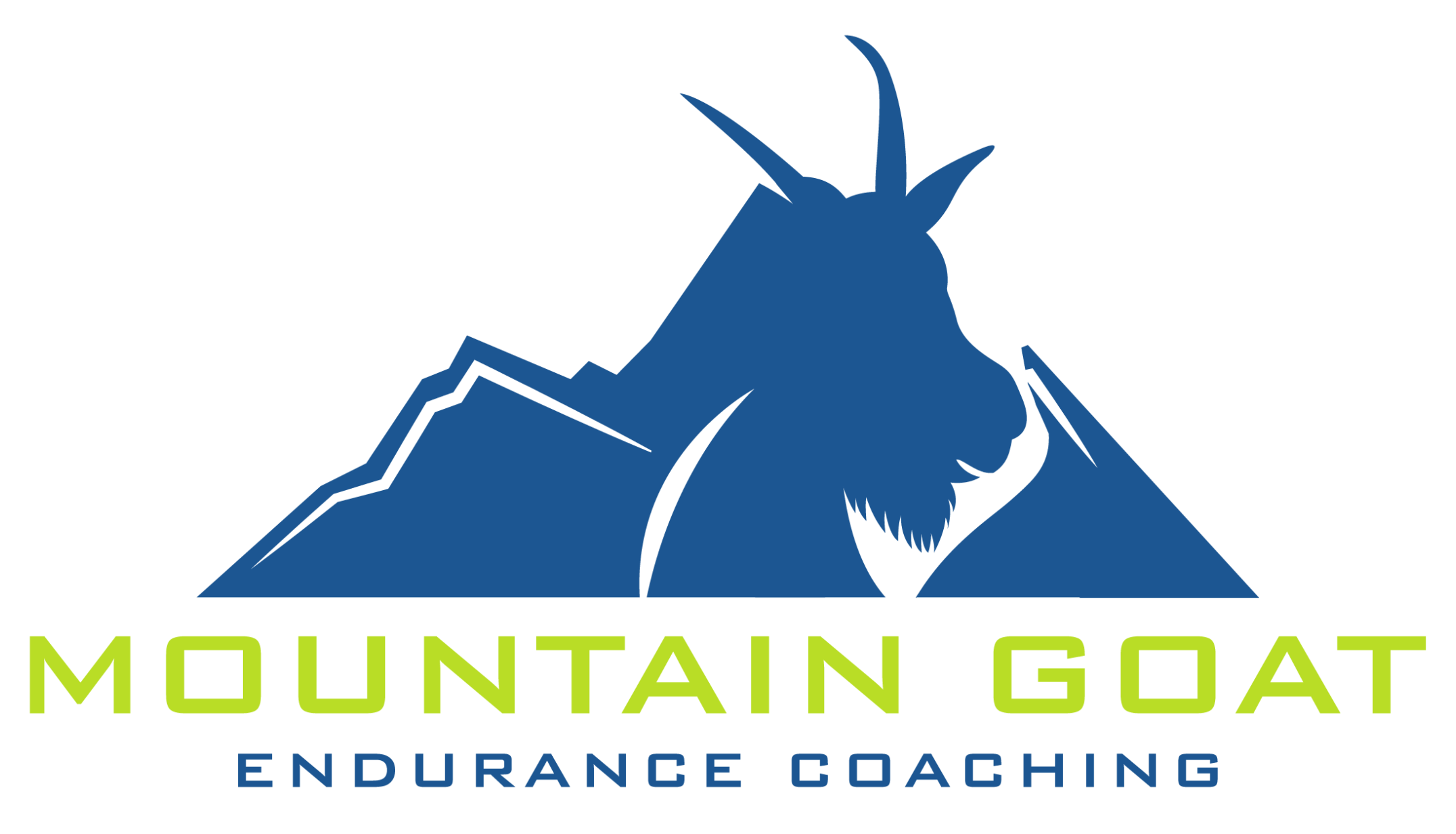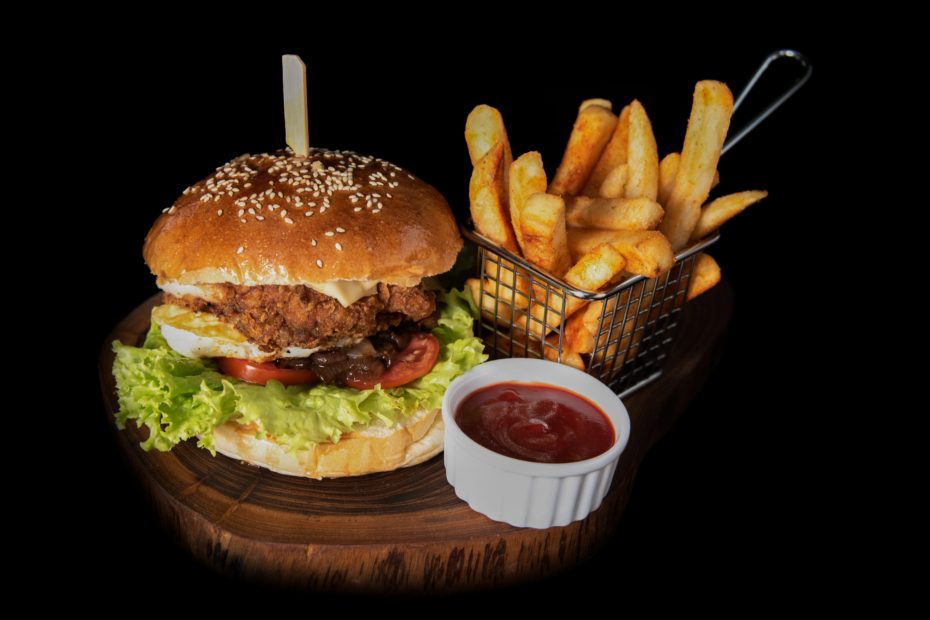If you eat more, you might run better. Here’s why it matters to me and why it should matter to you too.
**Fair Warning – Profanity.**
It’s taken me a long time to publish this this. I really believe that most athletes need to eat more to run better – but I just couldn’t… finish it.
As you’ll quickly see, this topic means a lot to me.
I talk about it a lot, but I’ve never – including here – felt like I’ve done it justice.
So instead of ignoring those feelings, I figured I’d address them this time from the beginning.
This topic matters so much because I see it every fucking day.
Most of the time, I get great messages from athletes.
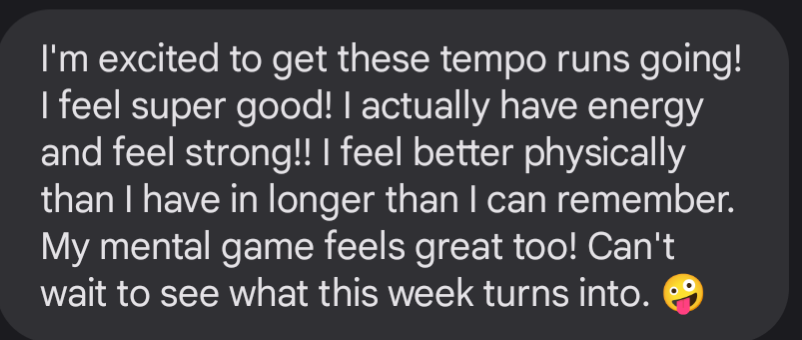
Those feel really good. When you move a struggling runner with injuries and fatigue from 1600 calories per day to 2000 and they find out they’re a hyper-responder, you look like a magician.
Someone loses fat, gets faster, sleeps better, and has more energy?
Wizard.
And don’t get me wrong, those messages feel really good.
But those conversations are NOT the most important ones.
The most important ones are the shitty ones.
Like the 15 minute check-in that turns into a 90-minute conversation with long stretches of silence and chunks of knowing laughter because you both struggle with food and the scale and neither of you really know how to deal with it, but goddammit you’re both trying and sometimes that’s all you can do.
I know some people – maybe a lot of people – would call a conversation like that unprofessional, but I don’t care. In my opinion, sometimes you have to know when to take off your coach hat and be a human with a person who’s struggling.
In my opinion, sometimes you need to be a human more than you need to be a coach.
If you disagree, I respect that.
But I’ve been through times in my life where I needed someone who “got it” more than anything else in the world. If I can be that person for someone… great. If I can help someone feel seen and heard for even 10 seconds. that’s worth infinitely more to me than a race time.
As if those things were even mutually exclusive.
They’re not.
If someone sees you for who you are, you’re more likely to do what is best for you because you know someone’s really trying to help you. They want to help you get better not because it looks good on their resume, but because they care.
The shit that happened at the University of Oregon only happens when you put results above the athlete. I’m not about that. Most coaches I know aren’t about that.
And sometimes, that means you have to be human while you’re being a coach.
Now that you know why I’m writing this… here’s why you (might) need to eat more.
Changing the Conversation
Most of the time, when people talk about overtraining and undereating, we see statistics first.
Something like “86% of those experiencing ‘overtraining’ weren’t eating enough” from this study and well summarized by Featherstonenutrition on IG.
If you’re new to this conversation, here are the bullet points:
- Overtraining = underrecovery.
- Most of the time, underrecovery involves undereating.
- Eat more → perform better.
All 100% TRUE.
But it’s far from a complete picture.
A lot of us have heard all of that 100 times. Unfortunately, it doesn’t do much good because we think things like:
- I’m different.
- That’s not what happened last year.
- But what about when I lost a bunch of weight when I first started running?
- But my coach in high school told me all endurance runners should be “X” pounds.
- All endurance athletes look “this way.”
Some of those are more true than others for a wide range of reasons.
And some are just horseshit. Like #3. Anybody who says #3 should be banned from coaching. Forever.
Now… I’m a data person. I love data. But it’s not all we need. We also need connection and understanding.
We need trust.
And as much as facts and figures help us know whether or not we’re going in the right direction, they’re rarely the root of trust.
For trust, we need connection.
And to connect, we need to feel seen and heard.
Do you need to eat more to run better?
I’m going to be completely honest… I have no idea if you “need” to eat more.
Unless I coach you and we’ve spent a lot of time discussing food, how would I?
But I do think there’s a pretty decent chance.
Over half of the people who come to me for training are under-fueling.
This is true of everyone I coach – from athletes training for ultras to people looking to lose a little fat and feel a little better.
How do I know?
Well… I’ve done this long enough to know some of the signs – and I regularly ask people about them:
- Plateau in training progress
- Low libido
- High stress
- Always hungry
- Never hungry
- Low energy
- Moody
- Slow/no recovery ability
- Bad sleep
- Poor digestion
- No menstrual cycle
- Irregular menstrual cycle
- Weight stable even though trying to lose weight…
When it comes to athletes, it’s even easier. I recommend most athletes track their food when we first start, at least for a couple weeks. Just to be clear, that’s not always “tracking calories” – there are other ways to track food.
Time after time, people come to me training multiple per hours per week and eating 1600-1800 calories.
That could be a perfectly acceptable amount for an average American with minimal muscle mass who sits all day and rarely exercises.
Yet it’s insanely low for most athletes. There are exceptions. But you’re likely not one of them. You probably need to eat more.
So many athletes undereat – unintentionally or not. While the most common result is some tiredness or a short-term injury, it can lead to something bigger.
If you go deep enough into overtraining, you will end up with RED-S – Relative Energy Deficiency in Sport.
For years, experts called this condition “The Female Athlete Triad,” but they’ve started seeing it in so many people of all sexes and genders that they’ve changed the name.
Essentially, it’s a prolonged imbalance of energy in / energy out (calories in / calories out) – and it has caused the slow degradation and eventual downfall of quite a few high level athletes.
“Eat More to Run Better” applies to YOU.
As an athlete, you need to be at least aware of your fueling.
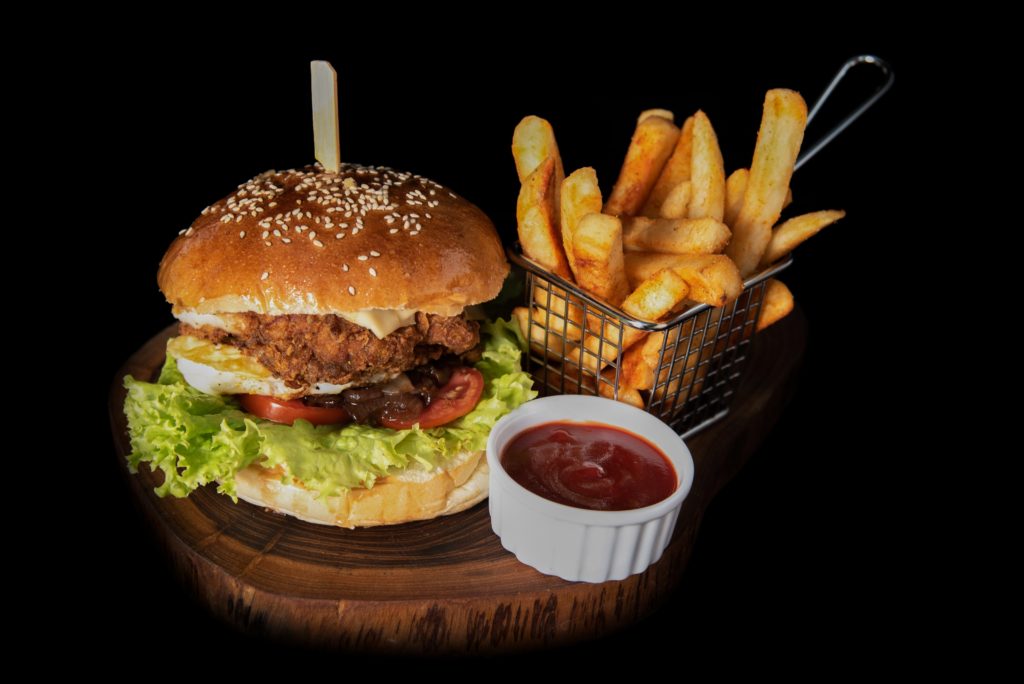
When many people picture someone who needs to eat more to run better, they often get a very specific image – a thin female who trains multiple hours per week, has been diagnosed with an eating disorder, tracks calories, and no longer has a period.
While the person in that image is certainly under-fueling, it’s a very incomplete picture.
I’ve seen under-fueling in a mid-50s, male, sedentary desk-worker who was carrying a good amount of extra body fat.
I’ve seen it in a mid-20s, lean, female, ultra runner.
And everyone in between.
Bodybuilders. Climbers. High-level runners. Weekend warriors. Sedentary Americans. Fighters…
Undereating is rampant.
Even amongst professional athletes.
Bailey Kowalczyk recently made a beautiful and heart-wrenching Instagram post about her recent relapse into Anorexia and her hard battle out of it.
Jake Riley, a professional, Olympic marathoner went public recently to discuss his personal battle with RED-S.
SIDE NOTE: I can’t say how much I appreciate people of Jake’s and Bailey’s caliber coming out to discuss this, especially because they’re still in the shit. While Jake’s recovery is looking good, he doesn’t actually know if he’ll be able to return to his former level of running and Bailey is well aware that she could relapse again. This shit is hard and I can never thank these people enough for this type of honesty.
If you clicked on the link to the article about Jake from Runner’s World, we start to see one of the bigger problems. While the article is fantastic, the page overall speaks to one of the primary reasons we continue to see this issue year after year.
If you scroll down to the bottom of that article, what’s the first thing you see after Cindy Kuzma’s bio?
“More from Nutrition & Weight Loss“
And that’s the problem. Right there. For one reason or another, we’re constantly trying to tie weight loss to running.
Even at the bottom of an article about a professional athlete who needed to eat more to run better.
How tone deaf can we be?
Whether it be 800-calorie, metabolism destroying diets like Optavia or coaches who favor weight loss over health… It’s no surprise we have this obsession with weight.
But just because it’s understandable does NOT make it acceptable.
Weight Loss & Performance
First, let me say this…
I don’t care one way or the other about your weight loss goals.
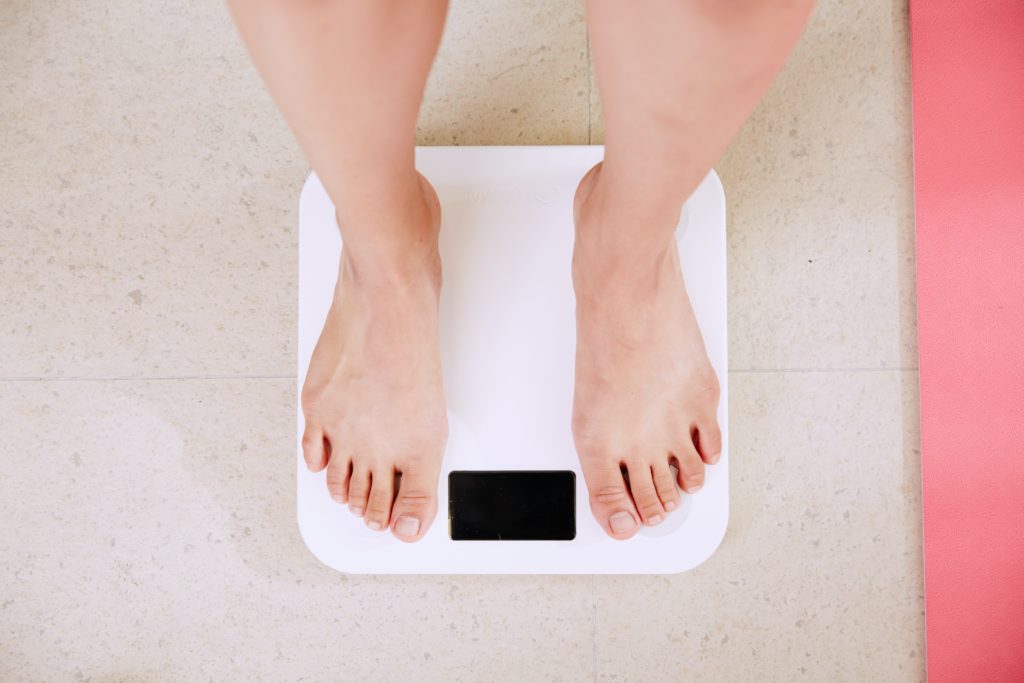
When I was 21 years old, I decided I wanted to get in shape. I lost 50 pounds and got strong. It made my life better. If you’re in a place in your life where losing fat would be good for you, then I think that’s great.
If you hold a bunch of body fat and don’t want to lose any of it, I don’t care about that either.
I have fat friends and I have lean friends and there are plenty of happy and unhappy people in both categories.
If you’re happy, that’s all that matters to me – and thankfully your happiness has no actual connection to how much fat is on your body.
Even if you feel like it does.
With that out of the way, let me address a couple key points.
- Weight matters when it comes to running.
- It matters a lot less than people think.
- If you try to target weight loss and performance at the same time you’re going to do a half-assed job of both and likely get yourself injured in the process
If you’re currently trying to perform – ie it’s race season – then you shouldn’t be trying to lose weight and instead you should focus on fueling your performance.
If you’re training hard, you hold some body fat, and your weight fluctuates a couple of pounds, so be it.
But it certainly shouldn’t be the target.
It shouldn’t stress you out either way – and the last thing I want to do is create further issues around weight.
I feel like some current rhetoric does nothing more than to push your brain from one panicked state to another – from “I’M EATING TOO MUCH” to “I’M EATING TOO LITTLE.”
Panic in either direction is not helpful.
If you under-fuel once or twice, it’s not the end of the world. Your body won’t fall apart because you didn’t eat properly for a day. Hell, it likely wouldn’t fall apart if you under-fueled for a month.
But it will fall apart if you keep underfueling.
If you keep training hard without enough food, you will get injured. It’s not “if” – it’s when.
For a historically mediocre athlete, my injury list is… extensive. Sprained ankle. Separated shoulder. Bursitis. Hip issues. Back issues. I’m in at least a little bit of pain every day – and it’s not even that bad compared to a lot of the athletes I coach.
I seem to have a knack for attracting athletes with a history of undereating.
Great athletes who have permanent injuries or body dysmorphia or a fear of the scale.
And while it’s not the only culprit, under-fueling has played a role every time.
I Wish I Had Known Earlier
The purpose of this article isn’t to scare you.
Or to push an agenda.
I’m just here to say – if you eat enough to support your goals, your life will be better.
I wish I’d learned that earlier. It would have saved me… so much.
Many of the athletes I coach wish they’d learned that earlier as well.
If you have fat loss goals, great. Prioritize a nutrient-dense calorie deficit, strength train, walk a lot, and make sure you have an exit plan out of your diet.
But if you have performance goals, eating enough is critical.
For one, you’ll perform better.
But you’ll also have more energy and not feel like garbage.
And you’ll get injured less.
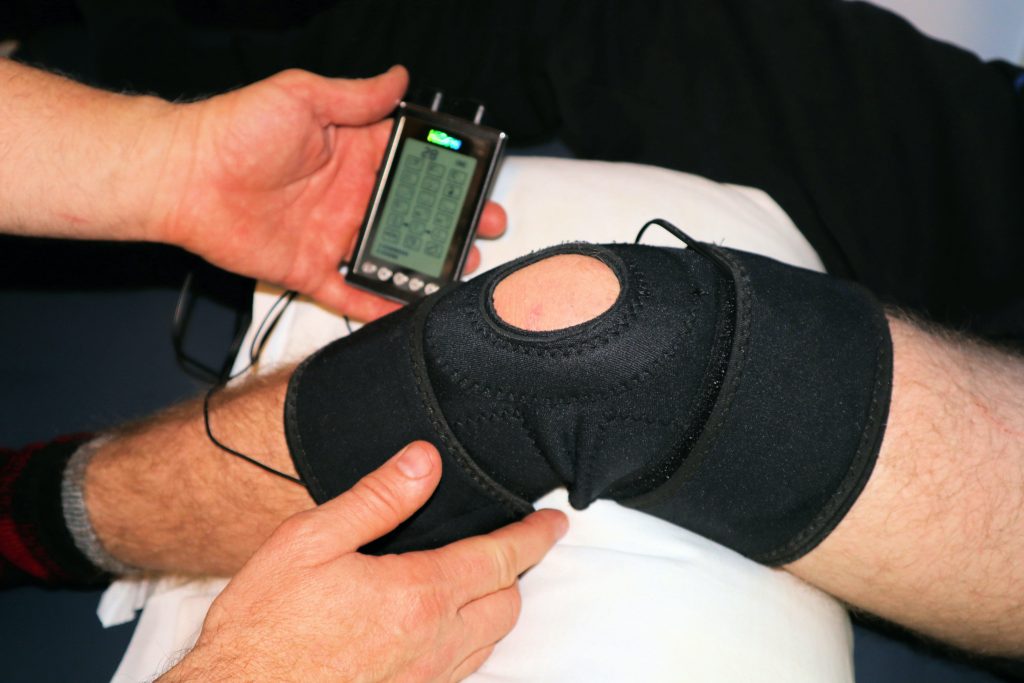
Eat more to run better.
It’s simple. Not easy, but simple.
If you know someone who needs this, please send it to them.
I’m sure I’ll talk about this again.
As you can tell… it’s important – at least to me.
